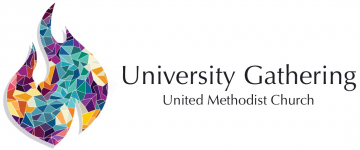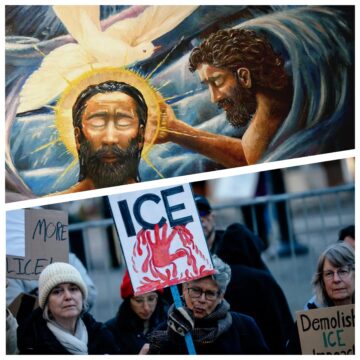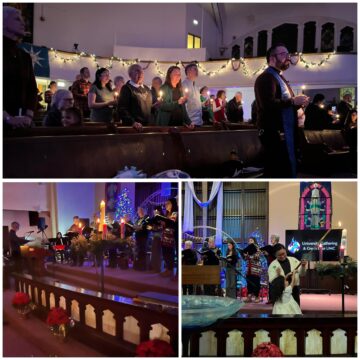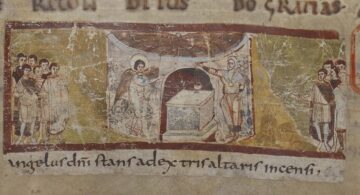MLK: Come and See
Martin Luther King of Georgia by R. Lentz
Kindred in Christ,
Soon our country will remember Rev. Dr. Martin Luther King Jr., a pastor and prophet who refused a faith that stayed comfortable while injustice thrived.
In his Letter from Birmingham Jail, King challenged white moderate religious leaders who chose order over justice and patience over change. He warned against what he called “negative peace,” which he defined as “the absence of tension,” rather than “a positive peace which is the presence of justice.” His challenge still confronts us today: don’t stand at a distance—come and see.
Come and see God rising where hope was buried.
Come and see love practiced through nonviolence.
Come and see justice that disrupts fear and power.
That same invitation is at the heart of the Gospel. In John 1:29–46, Jesus does not demand certainty or offer easy answers. Again and again, he simply says, “Come and see.” It is an invitation to follow, to risk change, and to live toward what Dr. King would later call the Beloved Community.
This Sunday, we remember Dr. King and listen again for Jesus’ call in our own time. Come and see.
Alongside you,
Pastor Paul Ortiz
Belovedness and Baptism
Kindred in Christ,
On Baptism of the Lord Sunday, we remember that Jesus does not stand above the water issuing commands. He steps into the river with those marked as sinners, suspects, and outsiders. In that place of vulnerability and solidarity, heaven breaks open and names him Beloved (Matthew 3:13-17).
Baptism tells us something unsettling about God and institutional power: legality is not the same as righteousness. History is crowded with laws that harmed the vulnerable and were defended as “order.” Every campaign of ethnic cleansing was once legal, and only later named for the evil it was. What we are witnessing in the recent actions of ICE belongs to that same story. As a church shaped by the waters of baptism, we cannot remain silent. We must name this plainly—it is evil.
Human brokenness is one thing; systems that terrorize families and call it security are another. The baptized Christ does not sanctify fear or violence. God stands in the water with those who are surveilled, detained, and disappeared, declaring them beloved and of inherent worth.
This Sunday, we are grateful to have our own Jemina Marasigan, who will be preaching her first sermon, and inviting us to go deeper into what it truly means to be named God’s beloved and what it asks of us to see others as beloved too. I will be present with you as we listen, worship, and discern together.
To follow Jesus after the river is to claim a different allegiance, to refuse to baptize cruelty, to resist the normalization of harm, and to live our baptism out loud. As a church, we are called not only to believe in belovedness, but to practice it by showing up, speaking out, protecting the vulnerable, and bearing witness to a grace that frees the captive and insists that no one is disposable in the eyes of God.
Alongside you,
Pastor Paul Ortiz
Moments of Epiphany
Awake My Soul by Mike Moyers
Kindred in Christ,
As Christmas fades, the church invites us into a new season called Epiphany.
Epiphany is not about having a sudden “aha” moment or getting everything right. It is about being drawn in. It is the season when light appears in unexpected places, and we begin to notice that God is calling us deeper still.
This Sunday, we begin Epiphany with the story of the magi (Matthew 2:1-12). These travelers were outsiders, seekers, and, frankly, a little strange to the Hebrew people in Matthew’s Gospel, with different customs, beliefs, and ways of reading the world. They did not have certainty, but they followed the light anyway. Their journey reminds us that faith is less about correct answers and more about being open to transformation.
We also begin a new sermon series, Moments of Epiphany. Throughout the season, we will explore stories where God’s presence becomes visible in surprising ways. Not moments of explanation, but moments of disruption, invitation, and change.
Epiphany asks us to pay attention. To notice where light is breaking through. To listen to voices from the margins. And to consider how encountering Christ might send us home another way.
I hope you will join us as we follow the light together.
Alongside you,
Pastor Paul Ortiz
God Pitched a Tent Among Us
Christmas Eve Service 2025
Kindred in Christ,
As we move from the glow of Christmas Day into the quieter season that follows, my heart is full of gratitude for this community. This Advent and Christmas have been a gift—from the steady beauty and dedication of our Choir each week, to the shared laughter and joy of The Muppet Christmas Carol, which welcomed families from our neighborhood, to a Christmas Eve service alive with carols, candlelight, and many new faces. Again and again, you made room for wonder, welcome, and connection. Thank you to our amazing staff, volunteers, and community for the many ways you offered your gifts so generously.
Christmas reminds us that God comes not through dominance or spectacle, but through the small and seemingly ordinary. John’s Gospel tells us that “the Word became flesh and dwelt among us.” In the Biblical Greek, eskēnōsen means that God “pitched a tent” among us, choosing nearness over distance, vulnerability over command, and presence over control.
This truth shapes our life together. In small, faithful acts such as showing up, sharing meals, singing, and offering welcome, we bear signs of God’s justice, peace, and love. These quiet practices form us in the way of Jesus, and I am excited for how we will continue to grow together in the year ahead.
While I am away this week, I am grateful for Nancy Goddard, who will be preaching this Sunday. As we keep listening for God’s presence amid the beauty and the struggle of the Christmas story, she offers this invitation for the coming week:
“The Gospel reading for this Sunday tells of the slaughter of the Holy Innocents, a story of fear, cruelty, and power threatened by the Christ child. Herod is not unlike despots we know today. Where is hope in the face of such violence? Come this Sunday as we look to the Christ child for the answer.”
Even as the Christmas story turns toward hard truths, hope remains. God is still with us, pitching a tent among the vulnerable, dwelling in the midst of the fragile, and calling us to live love in tangible, faithful ways.
Alongside you,
Pastor Paul
Making Room for One Another
9th-Century Carolingian Illumination of Zechariah and the Angel Gabriel
Kindred in Christ,
As we continue our Advent & Christmas series The Will to Dream, this Sunday we will gather to light the Love Candle and reflect on a story of waiting, listening, and making room.
In Luke’s Gospel, we meet an elderly couple, Elizabeth and Zechariah, who have lived with long disappointment and unanswered prayers, something many of us can relate to. Yet through silence, patience, and trust, God begins to open space for something new, not only for them, but for the sake of others.
The ancient image above shows Zechariah in the temple, offering incense as a priest, the angel Gabriel surprising him, and the people waiting beyond the veil. In this encounter, God’s promise begins to unfold, and Zechariah enters a period of silence and deeper listening. This holy pause makes room for Elizabeth’s voice and God’s plan in the birth of her son John, who will point the way to Jesus, who makes room for us all. It reminds us that love grows when we step back, pay attention, and create space for God and for one another.
As a community, we are learning this together. I am deeply grateful for our faith community, growing in diversity, inclusion, and a commitment to justice, shaped by both long-time members and those newer to our community. Each week, familiar faces and new ones gather side by side in worship, conversation, and shared ministry, helping form a church where all are seen, welcomed, and held with care.
I am also excited for our Christmas Eve service this Wednesday. It will be a meaningful time of song, story, candlelight, and hope as we celebrate the love that comes to dwell among us.
Wherever you find yourself this season, full of joy, longing, or somewhere in between, you are invited. There is room for you here.
Alongside you,
Pastor Paul




